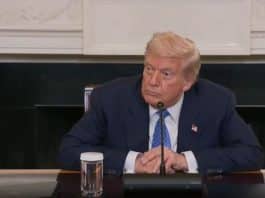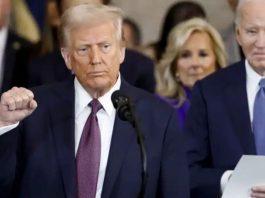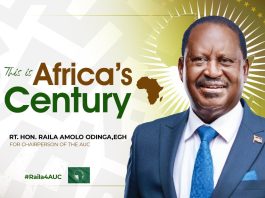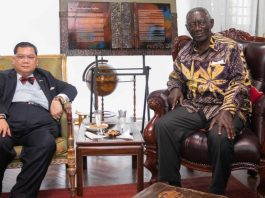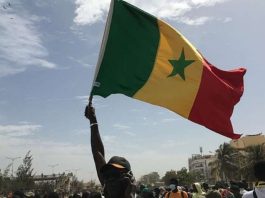By Jon Gambrell
DUBAI, United Arab Emirates (AP) – The president of Somalia, a country plagued by violence from Islamic militants, said Tuesday that al-Qaida and the Islamic State group constitute the same “evil force” and must be confronted in the wake of the attacks on Paris.
President Hassan Sheikh Mohamud knows the danger extremist groups pose. He himself has been targeted for assassination by the al-Qaida-linked group al-Shabab, which continues to carry out attacks in his arid Horn of Africa nation.
Mohamud stressed the need for Western countries to embrace both military and economic measures to derail extremists. He acknowledged that some al-Shabab militants have pledged their loyalty to the Islamic State group.
“At the end, the result is the same: It is an evil force that’s there for destruction, whether they’ve got the name al-Qaida or Daesh,” Mohamud told The Associated Press, using an alternate Arabic acronym for the extremist group.
 “They’re just rebranding, nothing more than rebranding,” he continued. “Their actions, their ideologies are all the same – (though) maybe one is more brutal than the other.”
“They’re just rebranding, nothing more than rebranding,” he continued. “Their actions, their ideologies are all the same – (though) maybe one is more brutal than the other.”
The chaos of extremism has plagued Somalia, a country of 10 million people, since the 1991 collapse of military ruler Mohamed Siad Barre’s 21-year Marxist reign. Warlords from rival clans vied for power as a famine starved its people. United Nations and U.S. forces eventually intervened, sparking a battle chronicled in the book and film “Black Hawk Down” that killed 18 U.S. soldiers.
That clash saw the corpses of U.S. troops dragged through the street and America withdraw from Somalia. In the meantime, Islamist hard-liners who gained power were later pushed out of the capital, Mogadishu, giving rise to the al-Shabab militant group that’s launched attacks across Somalia and into Uganda and Kenya.
Al-Shabab had pledged its support to al-Qaida, but recently a splinter cell within the group offered its allegiance to the Islamic State group.
The U.S. has targeted al-Shabab leaders in drone strikes while Somali forces, backed by troops from African nations, regained control of Mogadishu in 2011. But suicide attacks from al-Shabab continue unabated, challenging the Somali government even as investment and rebuilding take hold.
Mohamud, in Dubai for an African business conference, acknowledged the continuing attacks hurt Somali efforts to rebuild the country. However, he stressed that “ideologies have no citizenship and no borders. They move around the world wherever they can sneak in.”
That’s especially true in Africa. The Islamic extremist group Boko Haram, which has launched attacks for years in northeast Nigeria, also has pledged allegiance to the Islamic State group.
It’s not clear how strong the Islamic State tie is between the al-Shabab splinter group and Boko Haram, though extremists in Libya have committed filmed atrocities in the group’s name, including mass beheadings.
In Somalia, Mohamud said the government’s offer of amnesty to al-Shabab militants saw some lay down their arms, though he didn’t offer specific numbers.
He also insisted Somalia was on the cusp of winning the war against al-Shabab – even though in July he said a planned 2016 election for the presidency would not take place because of the group’s militant attacks. Parliament will elect a president instead.
“The last time we had a free and fair election in Somalia was 1969,” he said. The security situation, combined with an ongoing review of the country’s laws and electoral system, “makes one man, one vote not possible in 2016,” he said.
Meanwhile, Somalia relies on troops from other African nations to ensure its stability and foreign donors, like the United Arab Emirates, to pay for its own solders’ salaries. While on his trip, Mohamud said his government had talked with officials from Dubai’s government-backed DP World, one of the world’s largest seaport operators, about possible business opportunities.
The soft-spoken Mohamud remained upbeat about Somalia’s future despite the challenges.
“The good thing in it is whenever we see Somalia before, when people (had) differences in the politics, we used to immediately grab up the gun and start shooting each other,” Mohamud said. “Now, we are not.”
Source: The Associated Press

